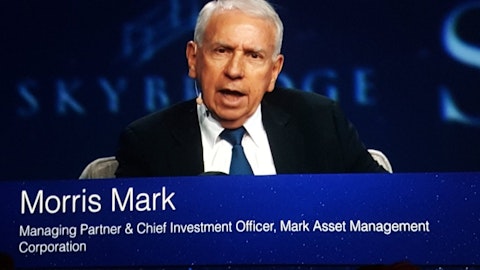4. Warner Bros. Discovery, Inc. (NASDAQ:WBD)
Number of Hedge Fund Holders: N/A
Year to Date Loss as of August 5: 42.78%
Warner Bros. Discovery, Inc. (NASDAQ:WBD) provides content across various distribution platforms in approximately 50 languages worldwide. . The company owns and operates various television networks including Discovery Channel, Animal Planet, MotorTrend, and Eurosport among others. As of August 5, Warner Bros. Discovery, Inc. (NASDAQ:WBD) has dipped by 42.78% year to date.
On August 5, Barclays analyst Kannan Venkateshwar slashed his price target on Warner Bros. Discovery, Inc. (NASDAQ:WBD) to $17 from $19 and reiterated an Equal Weight rating on the shares. The analyst noted that limited near-term catalysts and execution risk may result in Warner Bros. Discovery, Inc. (NASDAQ:WBD) trading at discount levels persistently.
On August 4, Warner Bros. Discovery, Inc. (NASDAQ:WBD) slashed its 2022 adjusted EBITDA guidance to a range between $9.0 and $9.5 billion, down from its prior guidance of $10 billion, due to a negative macroeconomic backdrop which is impacting ad sales, and a change in the streaming industry dynamics.
As of March 31, Laurion Capital Management owns roughly 13.58 million shares of Warner Bros. Discovery, Inc. (NASDAQ:WBD) and is the largest shareholder in the company. The fund’s stakes were valued at $338.41 million and the investment covers 4.13% of its investment portfolio.
Here is what Silver Ring Value Partners, an investment management firm, had to say about Warner Bros. Discovery, Inc. (NASDAQ:WBD) in its first-quarter 2022 investor letter:
“Discovery completed the acquisition of the Warner Media business from AT&T in April, and the combined business is now named Warner Brothers Discovery. We are currently in the middle of an interesting technical event, following the spin-off special situation playbook.
The acquisition was structured as a spin-off of Warner Media, with AT&T shareholders receiving ~ 70% of the shares in the combined entity, or ~ 1.7B shares. Many of these shareholders owned AT&T for its phone business and its dividend. It appears that there has been elevated noneconomic selling as these shareholders exit regardless of price. On the other side, few if any investors want to buy the WBD shares prior to this forced selling being over.
This has caused the stock to decline substantially despite being already priced at a low valuation and reporting good recent results. The people selling aren’t likely considering either of those factors, which is what creates the opportunity. One wrinkle as compared to the usual spin-off special situation setup is that the non-economic selling is likely to last for some time given the retail nature of the shareholder base. This is different from the typical pattern where there is a quick sharp sell-off as institutional investors dump their shares quickly following the spin.
In anticipation of this situation, I had sold our equity prior to the major declines, and replaced it with January 2024 call options. I have since been using a portion of the cash generated from the equity sale to add to the option position as the stock price declines. While this does give up some time horizon, which I am usually loathe to do, both the technical selling and the question of the success of the merger integration are likely to be resolved well before then.
If I am correct and this is a much more valuable business than the market is giving it credit for, we will make a hefty profit. If I am wrong, and the combination of financial leverage, merger integration problems and secular risks are more serious than I foresee, we will have a moderate loss. I like our odds and the asymmetry of risk vs. reward.”





